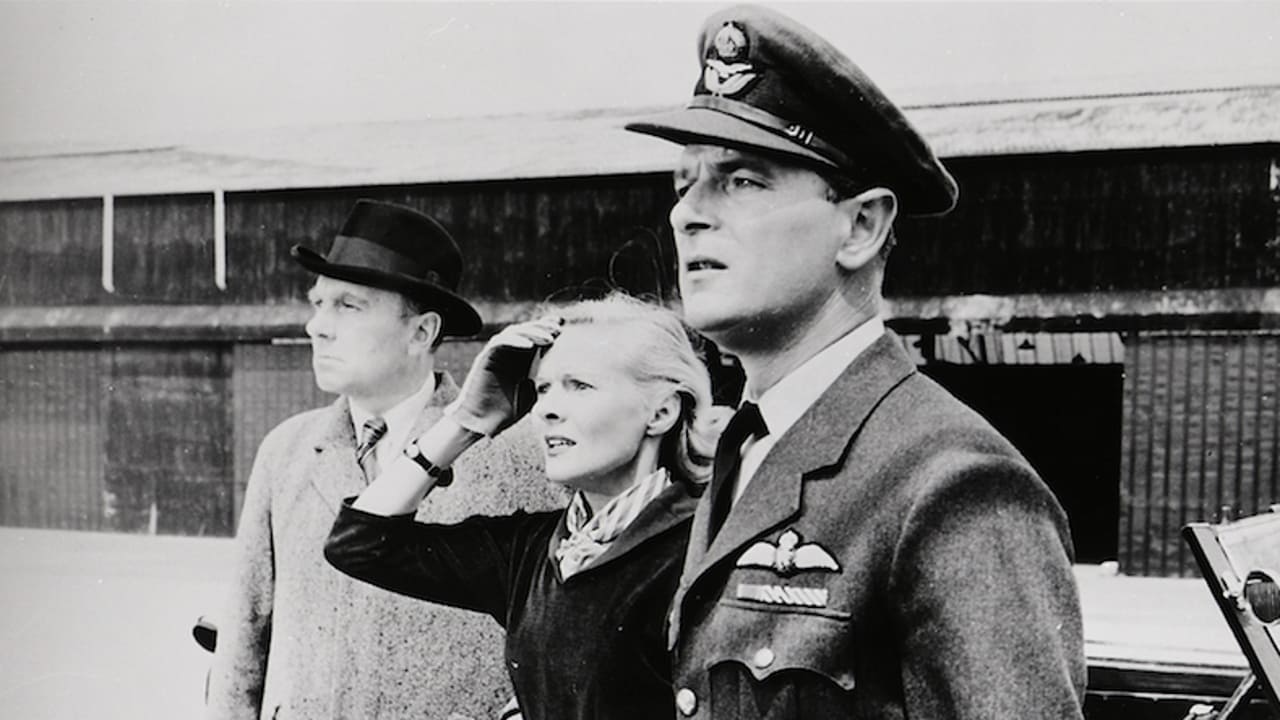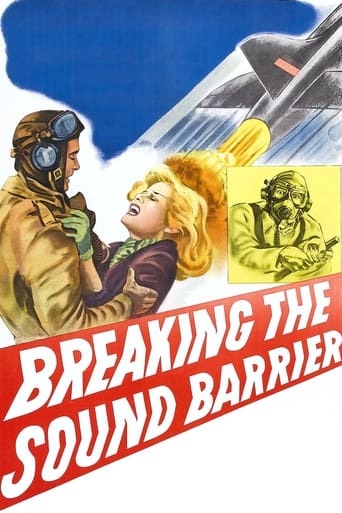



What a waste of my time!!!
The film makes a home in your brain and the only cure is to see it again.
View MoreYour blood may run cold, but you now find yourself pinioned to the story.
View MoreWhile it doesn't offer any answers, it both thrills and makes you think.
View MoreBREAKING THE SOUND BARRIER is the U.S. title for this film which I missed seeing when originally released. It was a pleasure seeing it for the first time tonight on TCM. RALPH RICHARDSON once again plays a father who was emotionally distant from his son (DENHOLM ELLIOT) and daughter (ANN TODD) and shows more concern for the progress of scientific investigation in solving the problem of supersonic flight than the welfare of individuals who sacrifice their lives to please him. He shows more constraint here as the father than he did in THE HEIRESS a few years previous.Under David Lean's direction, the film moves briskly through a series of events involved in breaking the sound barrier through jet propulsion at a time when the aircraft industry was making great strides after WWII.While the characters are fictional, so are the events depicted, since a British airman was not the first to break the sound barrier--something that American pilot Chuck Yaeger was quick to point out when he was invited to attend the world premiere of the film in London. It was broken by an American pilot as early as 1947.Tension between Richardson and his children helps make the fictional story more compelling and the acting by RALPH RICHARDSON, NIGEL PATRICK (as Ann Todd's pilot husband) and ANN TODD is excellent.Summing up: Interesting from many viewpoints despite being a bit too talky with a good background score from Malcolm Arnold.
View MoreBy many standards, David Lean's production of the film he directed in 1952, "The Sound Barrier" is both unusual and I suggest rewarding. The screenplay by Terence Rattigan I found to be riveting throughout. This I judge stems from the fact that its subject is men of vision, and what they do to about their greed for something unnameable, necessary and sometimes deadly. The author in the film is at pains not to paint such men as glory hunters, nor seekers after excitement alone; in one scene, the central character talks about the fliers of the past, and then suggests the men of the future will need vision even more than flying skills to conquer what awaits us--and the answer to what that is is given as "the stars"--called the final frontier in this film in all but name. There are three fliers we meet in the film at a fictitious industrial empire called Ridgefield. The boss's son who hasn't got what a flier needs, Tony, who marries his daughter and reaches his limit because he lacks the necessary genius, and Philip, who has "the right stuff". What I find extraordinary about this very well-directed cinematic tale is that it is always about the people and the joy and danger of flight at the same time, without the focus ever losing sight of the people. The music for this film was supplied by Malcolm Arnold, and it is extraordinary almost everywhere but I find never intrusive. One sequence involves one of the three pilots taking his new wife for a swift flight to Cairo from England; the scene accomplishes many things at once. She learns because of her journey, what some men see in the serenity of the sky, and even its danger; it introduces us to the third pilot and his wife; and we are given a sense of the camaraderie of the men who flew in those days; another such moment occurs when the French ace Geoffrey de Havilland is killed trying to break the sound barrier ahead of all others. Jack Hildyard and several others supplied the cinematography and aerial scenes; Elizabeth Hemminges did a fine subdued job on the costumes; Vincent Korda is credited with the Art Department's superb work while Muir Matheson is acknowledged as music director. Among the smallish cast, the pilots are all beautifully played. bright Nigel Patrick is likable ace Tony, young Denholm Elliot stands out as the boss's son, and John Justin is just right as the third of the trio, Philip. Joseph Tomelty is admirable as Will Sparks, the designer tormented by his own part in causing test pilots to risk their lives; Ann Todd is good as the tormented Susan, wife to Tony and daughter of the boss of Ridgefield. Dinah Sheridan is also lovely as Philip's brave wife; but it is Ralph Richardson's powerful realization of John Ridgefield, former pilot, towering presence and inspiring and dangerous leader of men who along with Justin gives the film its unusual dimension of mind and purpose. One may quarrel with the motivations attributed to Richardson in the last scenes; but he has been so alone in his vision and at such a cost, he may be forgiven for asking at last to be understood. The ending I find to be most satisfying, the film's climax tremendously moving. This is a great film, which has never been appreciated as it should have been. It is B/W film-making at its dramatic best for my money. Its science may not be perfect, but its depiction of human merit and what happens when that quality is lacking in a man is powerful indeed. Not to be missed.
View MoreThis mid-period David Lean picture is one of his most unusual a drama woven out of a story of scientific exploration. Not an easy kind of picture to make, but one held together by Lean's refined direction, a great cast and a surprisingly good script by Terence Rattigan.Although Lean was to make two small-scale pictures between this and Bridge on the River Kwai, this is perhaps more than any other a transition film between his early intimate dramas and the later massive epics he is now best known for. From the start Lean had always tried to photograph the psychological states of his characters, but The Sound Barrier is the first time he tells a bigger story through the personal experiences of individuals. This is the formula that has made Kwai and Lawrence of Arabia so popular and enduring. Like those later pictures, in the Sound Barrier the narrative switches to carry on the story through the eyes of other characters.A story like this, concerning test pilots, engineering and scientific breakthroughs, will only work if there is a strong drama underlying it otherwise it's only going to be of interest to techies. Lean seems totally aware of this and emphasises the human story behind the science. He directs with his editor's eye, composing action sequences with series of still shots, then throwing in the occasional sharp camera move to punctuate an emotional moment. He is moving away a little from the rather obvious expressionistic techniques of his earliest films towards a more straightforward yet effective style.By the early 50s the golden age of British film was over, but there was still a good crop of acting talent on offer, and there are plenty of names to mention in The Sound Barrier. Ralph Richardson plays (as he often did) the overbearing father-in-law, and lends the film a touch of class. Ann Todd, who was Lean's wife and not an exceptional actress, here gives what is probably her best performance she has the most difficult part in terms of emoting, but she carries it off brilliantly. This is also a great before-they-were-famous film, featuring a young Denholm Elliott (best known as Marcus Brody from the Indiana Jones films) and Leslie Phillips in his pre-Ding Dong days. The real acting treat here though is the rarely-seen John Justin, who failed to achieve stardom not through lack of talent, but through lack of interest on his part. His poignant final scene is one of the strongest in the whole picture.Of course, it's not just the plot of The Sound Barrier that is a work of fiction the science is complete nonsense as well, so don't go thinking that pilots really reverse their controls to get through the sound barrier. In many ways, this film reminds me of Dive Bomber, made ten years earlier with Errol Flynn and Fred MacMurray. That's also a test pilot drama, with a fair few plot similarities. One major difference though is that whereas Dive Bomber deliberately and bluntly disposes of any romantic angle, writing the female characters out of the story halfway through, in The Sound Barrier it is the pressures on the wives and sisters that is pushed to the fore. Ultimately, it is the way The Sound Barrier deals with loss and guilt that make it a strong and satisfying film.
View MoreThe movie really does capture a sense of time and the tremendous bravery of those involved in the breaking of the sound barrier.The cast is excellent and as usual Denholm Elliot steals every scene he's involved in. I feel this film is under-rated and is typical of much of the good work of British Cinema in the 50's
View More